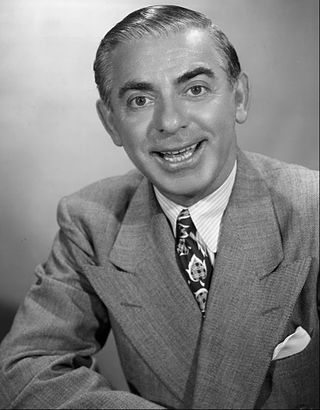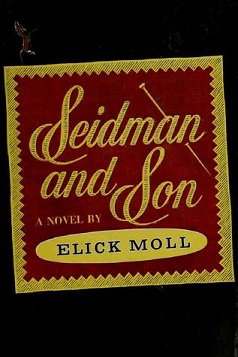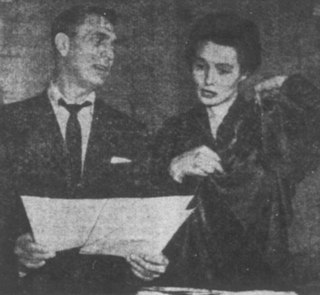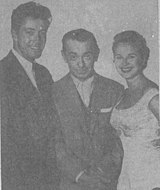
Eddie Cantor was an American comedian, actor, dancer, singer, songwriter, film producer, screenwriter and author. Cantor was one of the prominent entertainers of his era.

Playhouse 90 is an American television anthology drama series that aired on CBS from 1956 to 1960 for a total of 133 episodes. The show was produced at CBS Television City in Los Angeles, California. Since live anthology drama series of the mid-1950s usually were hour-long shows, the title highlighted the network's intention to present something unusual: a weekly series of hour-and-a-half-long dramas rather than 60-minute plays.

Seidman and Son is a bestselling 1958 novel by Elick Moll, adapted by Moll into a 1962 play.

Charles Cantor was an American radio and TV actor. Cantor was known for his frequent appearances on radio, sometimes, totaling 40 shows a week, during the 1930s, 1940s and 1950s. Cantor also appeared in nearly 30 television shows between 1951 and 1965.
"The Hidden Image" was an American television play broadcast live on November 12, 1959, as part of the CBS television series, Playhouse 90. It was the fourth episode of the fourth season of Playhouse 90 and the 121st episode overall.
"The Cruel Day" was an American television play broadcast on February 24, 1960, as part of the CBS television series, Playhouse 90. It was the tenth episode of the fourth season of Playhouse 90 and the 127th episode overall.
"Tomorrow" was an American television play broadcast on March 7, 1960, as part of the CBS television series, Playhouse 90. It was the 11th episode of the fourth season of Playhouse 90.
"The Hiding Place" was an American television play broadcast on March 22, 1960, as part of the CBS television series, Playhouse 90. It was the 12th episode of the fourth season of Playhouse 90.
"Sincerely, Willis Wayde" was an American television play broadcast on December 13, 1956, as part of the CBS television series, Playhouse 90. It was the 11th episode of the first season of Playhouse 90.
"The Big Slide" was an American television play broadcast on November 8, 1956, as part of the CBS television series, Playhouse 90. It was the sixth episode of the first season of Playhouse 90. Red Skelton and Shirley Jones starred in the play about a silent movie star. Skelton was nominated for a Primetime Emmy Award for best performance by an actor. Martin Manulis was the producer, and Ralph Nelson was the director.

"Forbidden Area" was an American television play broadcast live on October 4, 1956, as part of the CBS television series, Playhouse 90. It was the premiere episode of the series. The play concerns efforts to thwart a massive, Christmastime nuclear attack from a fleet of Russian submarines located off the coast of the United States. Rod Serling wrote the screenplay, and John Frankenheimer directed. Charlton Heston, Tab Hunter, Diana Lynn, and Charles Bickford starred.

"Heritage of Anger" was an American television play broadcast on November 15, 1956, as part of the CBS television series, Playhouse 90. It was the seventh episode of the series.

"The Fabulous Irishman" was an American television play broadcast live on June 27, 1957, as part of the CBS television series, Playhouse 90. It was the 39th episode of the first season.

"The Family Nobody Wanted" was an American television play broadcast on December 20, 1956, as part of the CBS television series, Playhouse 90. It was the 12th episode of the first season of Playhouse 90.

"The Return of Ansel Gibbs" was an American television play broadcast on November 27, 1958, as part of the CBS television series, Playhouse 90.

"Face of a Hero" is an American television play broadcast on January 1, 1959 as part of the CBS television series, Playhouse 90. John Frankenheimer was the director and John Houseman the producer. The cast included Jack Lemmon and Rip Torn.

"For I Have Loved Strangers" was an American television play broadcast on December 19, 1957, as part of the second season of the CBS television series Playhouse 90. Elick Moll wrote the teleplay based on a story by Don Murray and Fred Clasel. Franklin Schaffner directed, Martin Manulis was the producer, and Hedda Hopper hosted. Don Murray and Hope Lange starred. The story was based on Murray's personal experience working with European refugees. Both Murray and Lange donated their salaries from the production to the Homeless European Land Program (HELP) founded by Murray.

"The Gentleman From Seventh Avenue" was an American television play broadcast on January 30, 1958, as part of the second season of the CBS television series Playhouse 90. Elick Moll wrote the teleplay, Allen Reisner directed, Martin Manulis was the producer, and Albert Heschong was the art director. Walter Slezak, Patricia Neal, and Sylvia Sidney starred.

"Turn Left at Mount Everest" was an American television play broadcast on April 3, 1958, as part of the second season of the CBS television series Playhouse 90. Del Reisman wrote the teleplay, as an adaptation of a stage play by Lowell Barrington. Peter Lorre and Fess Parker starred.
Marilyn Cantor Baker (1921–2010) was as American actress, author, writer, producer, and comedian. She appeared on Broadway and smaller theaters, in nightclubs, on television, and on radio.













